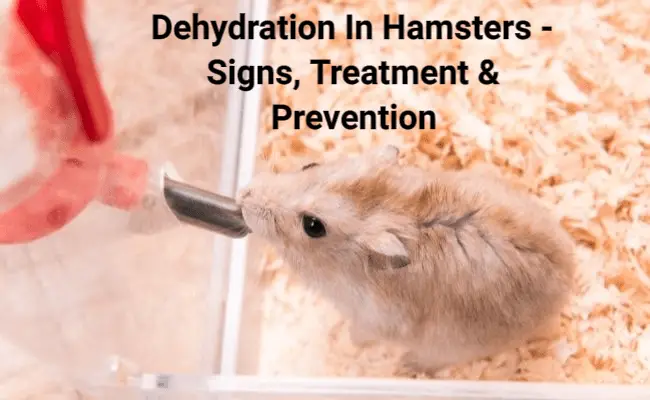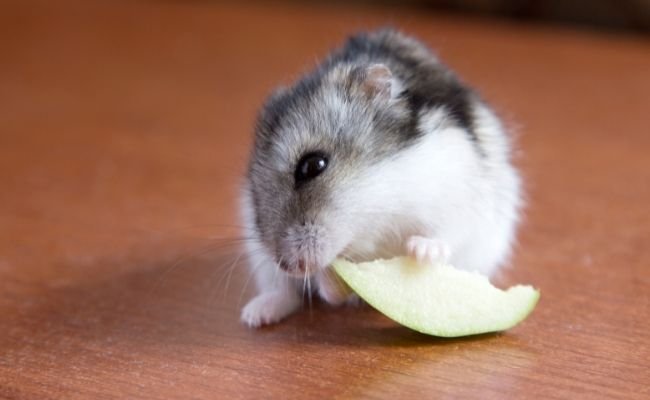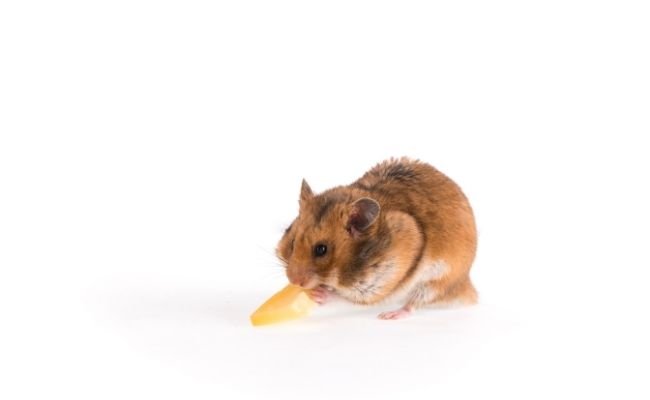Dehydration In Hamsters – Signs, Treatment & Prevention
Water is an essential part of life, even for hamsters. If you own a pet hamster, it is important to be aware of how much water your hamster requires every day and how to ensure that your pet stays hydrated at all times.
These little furry friends need water just as much as you do, and they can be prone to dehydration fairly easily, which can cause serious health problems. As such, it’s imperative to know indicators of dehydration in hamsters, prevention, and treatment.
Today is all about dehydration in hamsters. Therefore, if you have been having any bothering questions related to this topic, then you should be in for the greatest treat of your life.
What Is Dehydration?
Dehydration is a condition where the body loses more fluid than it takes in. This causes a disruption of normal body function and can lead to shock or even death if not treated quickly enough.
In other words, dehydration is lethal and should be addressed as soon as possible. That way, you will curb it from causing a series of other side effects.
What Causes Dehydration In Hamsters?

Dehydration in hamsters can be caused by environmental, dietary, behavioral, and health factors. Before you address the problem, first you should identify the cause. That’s the surefire way of ensuring the problem doesn’t keep on recurring.
Environmental Factors
Hamsters can become dehydrated as a result of high temperatures and humidity levels. As the temperatures soar, it becomes hard for the hamsters to maintain their body temperature, which can lead to them becoming dehydrated.
In addition, hamsters have a very low level of thirst response. This means that they don’t perceive being thirsty until they are already dehydrated. However, it is their way of adapting to the desert-like conditions in which they live naturally.
Dietary Factors
If you are feeding your pet too much food that is high in protein and fat, they can become prone to developing bladder stones, which make it harder for the hamster to be hydrated.
Again, if your hamster has been eating dry food most of the time, then they are bound to develop this health problem. While hamsters are naturally designed to eat dry food, adding some fresh veggies and fruits can add enough fluid into their systems.
Behavioral Factors
Hamsters that choose not to drink water are also prone to dehydration.
If you notice that your pet is not drinking enough water, then there could be something wrong with them. But again, hamsters are nocturnal beings, meaning that they are more active during the night than in the day.
That’s why you should ensure that they have fresh water available at all times of the day, not just when you are awake. They drink more water when active than when not, so they should be provided ample access to water in their cage.
Health Factors
One of the biggest causes of dehydration in hamsters is an underlying health problem. As such, if your pet shows symptoms of illness or has recently been released from a vet’s care, then you should take extra precautions to make sure that their hydration levels do not drop as a result.
Conditions such as diabetes, diarrhea, vomiting, fever, and kidney disease can all cause dehydration.
If your hamster is suffering from any of those conditions, then you should be prepared to provide additional care for them as a result. You need to keep a close eye on their water intake and make sure that they are drinking enough.
Signs Of Dehydration In Hamsters
There are several symptoms of dehydration in hamsters, each with its own significance. Some are easier to ignore while others can’t be ignored at all. Here are some of the most obvious warning signs that your pet is not properly hydrated.
Lethargy
Hamsters are naturally very active creatures. They are constantly on the go, exploring their environment and digging around. If you notice that your pet has suddenly become lethargic, then it might be a sign of dehydration.
If they are lethargic, slow to respond to stimuli, and unwilling to move around, then you need to act quickly. If you fail to address the problem now, it could turn into something much worse in the future.
Decreased Appetite
If your hamster has stopped eating or is feeding less than usual, then dehydration can be blamed for it. It might not seem like a big deal at the moment, but it could soon develop into something more.
Again, this is another sign that you need to pay attention to if you want to get ahead of the problem and prevent it from becoming worse than it already is.
Dry Skin And Fur
A hamster’s skin should always be moist and smooth, not dry and flaky. If your pet’s skin is dry and dull, then it could be a symptom of dehydration.
This is one of the more common signs that your hamster needs to take in more water. You can easily check yourself by rubbing your fingers on their skin; if it feels dry, then they need to drink more liquids.
Noticeable Wrinkles
If your hamster has visible wrinkles under the eyes, then there is something wrong with them. As we mentioned above, a hamster’s skin should be smooth and moist. But if you notice that they have developed wrinkles around their neck or eyes, then it could mean one of two things.
Either way, you need to take action now to prevent further complications from arising.
Weight Loss
The decrease in appetite can often lead to weight loss, and it’s a sign of malnutrition as well. As such, you need to monitor closely your hamster’s body weight and be on the lookout for any sudden changes.
If they have lost a considerable amount of weight in a short period of time, then you might have a problem that needs immediate action. But again, dehydration isn’t the only cause of weight loss, so it’s best to look for the cause from all possible angles.
Foul-Smelling Urine
A healthy hamster’s urine should have a light, fresh smell to it. If it is foul-smelling and has a yellowish color, then you might have a problem on your hands.
There are several reasons why this could be happening, but the most likely one would definitely be dehydration. You need to keep a close eye on your hamster and make sure that they are drinking enough to prevent further complications from arising.
Rehydrating A Dehydrated Hamster
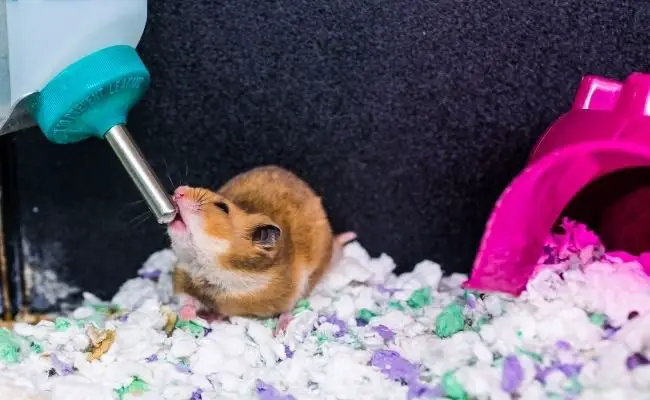
If you suspect that your pet is suffering from dehydration in hamsters, then you need to act quickly and take them to a veterinarian. The sooner the problem is treated, the better it will be for your pet.
Once they have been diagnosed with dehydration, they will recommend a few things depending on the status of your hamster. Where severe, vets will use advanced rehydration treatment. However, where not severe, they may tell you what to do.
Now, there are several ways how you can go about rehydrating them. You can try the following home remedies to help them regain their health.
- Keep the water bowl replenished
- Make use of electrolyte water.
- Frequent use of treats with high water content, for instance, cabbage, apple slices, and cucumbers.
- Rehydrating salts and sugars will be helpful as well.
- Use coconut water
However, the road to recovery is not simple, especially if your hamster has been dehydrated for a long time. Their body needs time to work its way back into normal conditions, so you need to be patient and wait it out.
If you wait too long to address the issue, then the problem could escalate into something far worse, so make sure that you are vigilant about your pet’s condition at all times.
Prevention Is Key
If you want to prevent dehydration in hamsters from ever happening again, then there are several things that you can do.
You can make sure that you provide them with fresh water at all times. Sometimes your hamster may fail to drink water simply because it’s dirty and maybe stinky.
So you need to change the water in their bowl frequently so that they have a fresh source of water at all times.
Again, monitoring the level of intakes is just as important. To do this, you can opt for a calibrated bowl that will allow you to track how much water they have been drinking.
In addition, always ensure that your pet gets immediate medical care if they are suffering from other conditions. That way, you will prevent dehydration that could have otherwise emanated from those issues.
How Long Can Hamsters Go Without Water?
Hamsters can go without water for about a week. They are desert animals, so they are quite adapted to going through long periods without having water.
However, that doesn’t mean you shouldn’t keep a close eye on their water bowl. In fact, you should always keep it full to avoid any serious complications down the line.
DON’T Bathe Your Hamster!
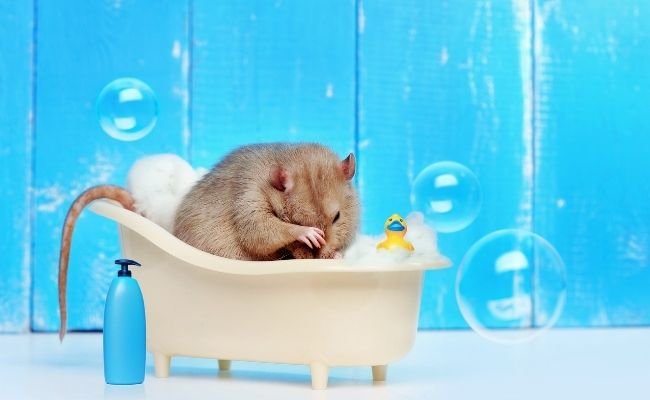
The moment you feel their dry and flaky skin, the first thing that you want to do is give them a bath. Unfortunately, that’s not something you should attempt doing because hamsters are not fans of being bathed.
By bathing your hamster, you expose your little friend to developing other issues like cold and pneumonia. You already have enough problems on your hands, so try to avoid adding another layer of issues.
Instead, you can opt to sand bath them. Hamsters love to roll around on sand, and as they do so, the coldness in the sand will help exfoliate their skin and remove dry cells.
Final Verdict
As you can see, dehydration in hamsters is something that should not be taken lightly. You need to pay attention to your pet’s drinking patterns and ensure that they have a sufficient water supply at all times.
It’s possible to rehydrate your hamster, but if you can, it’s best to prevent the issue from occurring in the first place. If you are observant enough, then you can have a better time identifying dehydration symptoms and taking quick action to avoid it.

